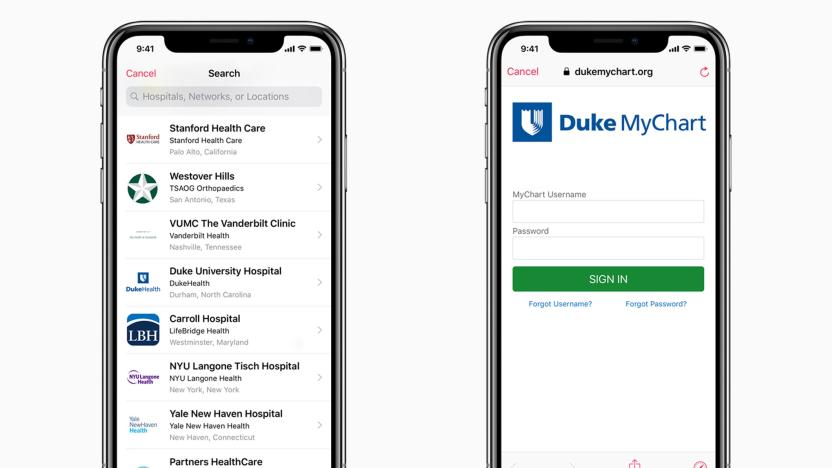medicalrecords
Latest

Indian health agency exposes details on millions of pregnant women
A health department in India exposed more than 12.5 million medical records for pregnant women after it failed to secure a database. The records span five years for a state in the north of the country, and include sensitive data such as family medical history, the mother's age, details of other children, doctor information and court case details.

Amazon’s next healthcare move is software that can mine medical records
Amazon is offering a new software that can mine medical records for information, the Wall Street Journal reports. The software can reportedly scan digitized patient records and pull out data, a service that healthcare professionals can use when considering treatments and hospitals can use to cut costs. "We're able to completely, automatically look inside medical language and identify patient details with incredibly high accuracy," Matt Wood, general manager of artificial intelligence at Amazon Web Services, told the Wall Street Journal.

Facebook wanted users’ medical data for a research project
CNBC reports today that Facebook was recently designing a research project that would collect users' Facebook data and medical information in order to develop insights into how social data could inform treatment development and patient care. The project has since been halted, but the company had approached a number of health organizations including Stanford Medical School and the American College of Cardiology.

Apple now lets you access medical records in Health app
Apple released iOS 11.3 today, and along with a slew of other fun additions, the update includes a new feature: Health Records. If you're a patient within certain health systems -- like Duke, NYU Langone, Stanford and Yale -- you can view your medical records on your iPhone.

Google purges private medical records from search
Very few things qualify for removal from Google's search results, and according to Bloomberg, that list just grew by one. The tech titan has apparently begun purging personal medical records from results pages -- Google didn't make a big announcement about it, but a new line on its Removal Policies website confirms the new rule. Under the section marked "Information we may remove," there's a new entry that says "confidential, personal medical records of private people."

Hospital network hackers nab personal info of 4.5 million US patients
In April and June, one of the largest hospital networks in the US was hacked. Community Health Systems says that cyber attacks originating in China stole the personal details of 4.5 million patients including names, addresses, telephone numbers, birth dates and Social Security numbers. In a regulatory filing, the company explained that an investigation into the breach showed "methods and techniques" used were similar to those employed by a group that's been active in the country. Said group usually goes after intellectual property (like medical equipment data) according to the report, so the company doesn't believe that the personal info would be exploited. What's more, both credit card numbers and clinical data weren't touched. Community Health Systems says it's removed the hackers' malware, and is in the process of notifying patients involved across its 206 hospitals that span 29 states. [Photo credit: Jonathan Wiggs/The Boston Globe via Getty Images]

Tiny RFID amulet stores medical records, makes paramedics' lives easier
Using RFID to store medical records, ultimately making the jobs of paramedics and doctors that much easier, is hardly a new concept. But, for the most part, such devices have been limited to clinical trials. Asahi Kasei Corp. is hoping to change that with the debut of a tiny, 3cm-square charm that can be read by a computer or smartphone. In addition to basic info, such as name, birth date, and blood type, the chip could transmit links to more storage-intensive data like X-rays images. Instead of building out a proprietary system, the company is relying on established technology called FeliCa from Sony. That means the device will enjoy broad compatibility with existing products, and should be inexpensive to produce. Asahi Kasei hopes to begin selling the medical amulets to cities and hospitals within a year, for as little as ¥2,000 (around $25).

London's E-Health Cloud program will send patient records to the stratosphere next month
You'd think that the recent spate of high-profile cyberattacks would've deterred the healthcare industry from sending patient records to the cloud -- but you'd be wrong. Beginning next month, all data on patients at London's Chelsea and Westminster Hospital will be stored in a centralized database, accessible from any computer, smartphone or tablet. Under the National Health Service's pilot program, known as E-Health Cloud, patients will be able to decide which doctors, nurses or family members can view their records, allowing them to easily share their data with other specialists. Flexiant, the Scottish software company that developed the platform, hopes to eventually expand it to other treatment phases, including assisted living, and insists that its system will help the NHS save money in the long-term. Security, however, will likely prove critical to the program's success. Users will have to pass multiple ID checkpoints to access the database, but privacy-wary Londoners might demand protection a bit more robust than an automated bouncer. You won't need to adhere to a dress code to view the full PR, available after the break.

NYU medical center goes sci-fi, scans patients' palms
NYU's Langone Medical Center is getting a jump on that whole 21st-century medical care thing by ditching the clipboards and paperwork for palm scans and digital databases. On June 5th the hospital threw the switch on an electronic patient-tracking program from Epic Systems and paired it with biometric identification technology from PatientSecure, which scans the veins in persons hands using near-infrared light. Instead of being forced to fill out forms with your insurance info and social security number every time you visit, you simply place your hand on a scanner and -- ta-da! -- your records come right up. By combining the vasculature scans (which are even more unique than fingerprints) with patient photos, NYU should be able to minimize misidentification and cut down on duplicate records. Rather than go out on some cheesy pun about palm reading, we'll leave the predictable word play to the folks at ABC news -- check out their coverage after the break alongside PR from the Langone Medical Center.

IBM's Jeopardy-winning supercomputer headed to hospitals. Dr. Watson, we presume?
We always knew that Watson's powers extended well beyond the realm of TV trivia, and now IBM has provided a little more insight into how its supercomputer could help doctors treat and diagnose their patients. Over the past few months, researchers have been stockpiling Watson's database with information from journals and encyclopedias, in an attempt to beef up the device's medical acumen. The idea is to eventually sync this database with a hospital's electronic health records, allowing doctors to remotely consult Watson via cloud computing and speech-recognition technology. The system still has its kinks to work out, but during a recent demonstration for the AP, IBM's brainchild accurately diagnosed a fictional patient with Lyme disease using only a list of symptoms. It may be another two years, however, before we see Watson in a white coat, as IBM has yet to set a price for its digitized doc. But if it's as sharp in the lab as it was on TV, we may end up remembering Watson for a lot more than pwning Ken Jennings. Head past the break for a video from the University of Maryland School of Medicine, which, along with Columbia University, has been directly involved in IBM's program.






